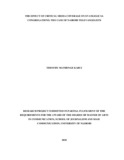| dc.description.abstract | This study sought to explore the effect of critical media coverage on evangelical congregations. The specific objectives were to assess the level of awareness of evangelical congregations to critical media coverage, to explore the extent to which critical coverage of televangelists affect evangelical congregation loyalties, to establish the attitude of evangelical congregations to critical media coverage and to examine the factors that determine evangelical congregation loyalties. The study utilised descriptive research design with the study population being total congregation in three churches which were Jubilee Christian Church headed by Televangelists Bishop Allan Kiuna and Reverend Cathy Kiuna, Helicopter Ministries headed by Televangelist Bishop Thomas Wahome Neno Evangelism Centre headed by Televangelist Bishop James Nganga. Stratified random sampling was used to select 378 respondents. The study employed mixed methods. The findings were presented in percentage, tables and frequency distributions. Quantitative data included close-ended information such as that found to measure attitudes (like rating scales), and behaviors (like observation checklists. Qualitative data consisted of open-ended information that the researcher gathered through interviews and observations. Quantitative data was collected using a questionnaire and analysed using descriptive statistics. Participants were subjected to excerpts from the media which depicted televangelists as taking part in fleecing of poor flock, being involved in cases of adultery and engaging in corruption. The study established that congregants in churches led by the top televangelists believe that the mainstream media is normally biased against their ‘men of God. In support of limited effects theory, the study revealed that critical media coverage of leadership excesses has limited effect on congregation loyalties. The study recommends a change of tact in the way the media covers the matters of faith. The study also recommends that in public interest, the media should place more emphasis on ‘full gospel’ as opposed to ‘seed gospel’ or ‘miracle gospel’ when giving airtime to televangelists. Equipping Christians with the true gospel will make them less venerable to shallow gospel of seed and at times stage managed miracles the congregants are exposed to. | en_US |



